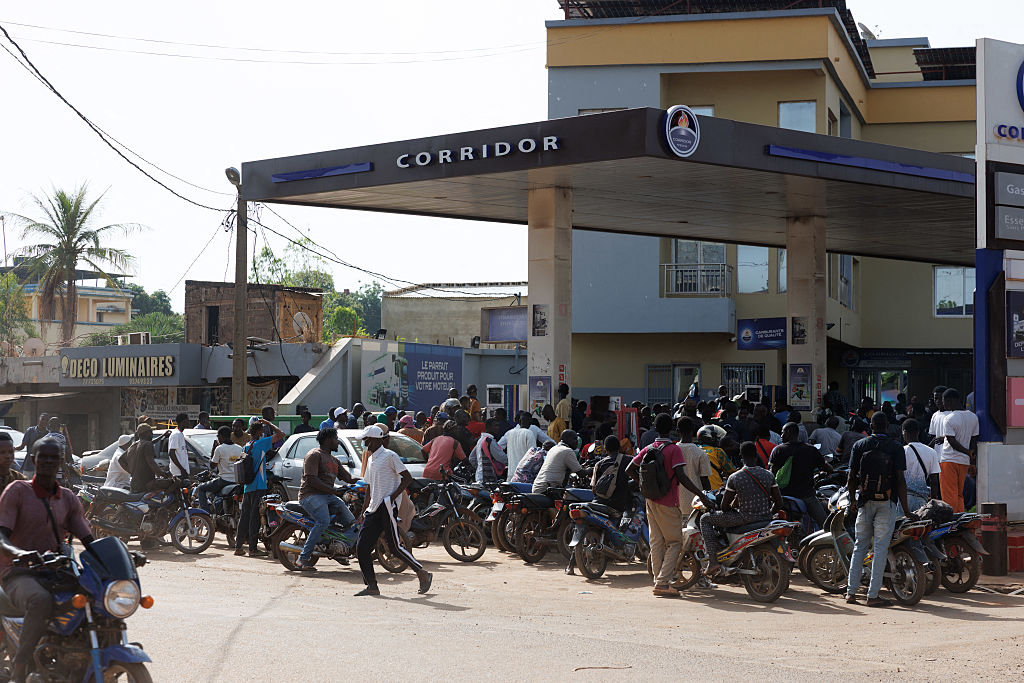The Jama’at Nusrat al-Islam wal-Muslimin terror group declared in September that it would stop any fuel tanker entering Mali from neighboring countries. Since then, hundreds of trucks from Côte d’Ivoire and Senegal have been attacked and burned in Mali, sometimes as they were escorted by Malian military forces.
Malian truck drivers often die in attacks by the terrorist group, also known as JNIM, which is linked to al-Qaida. Truck driver Bablen Sacko said he has witnessed these attacks and narrowly escaped death.
“Apprentices died right behind us,” Sacko told Agence France-Presse. “Everyone has a role in building the country. Ours is to supply Mali with fuel. We do it out of patriotism.”
Due to JNIM’s blockade, the country now faces a fuel shortage that is exacerbating severe, recurrent power failures that have crippled the economy since 2020. The current military junta, led by Gen. Assimi Goïta, has failed to halt JNIM’s recent momentum in southern Mali, where the terror group has cut off trade routes, starved towns and tested the limits of the state’s control.
Goïta’s junta on November 2 announced a two-week closure of schools and universities due to fuel shortages, which also have rendered some agricultural equipment inoperable in the middle of harvest season. JNIM now also blockades Bamako, the national capital.
According to Oluwole Ojewale, a research fellow at Nigeria’s Obafemi Awolowo University, such blockades are instruments of coercive governance and asymmetric warfare designed to weaken the junta, undermine public confidence in the military, and possibly solidify control. JNIM has mostly enforced blockades in vast, semi-arid zones crisscrossed by ungoverned routes.
“Many of these areas lie beyond the reach of effective state presence,” Ojewale, also a regional coordinator at the Institute for Security Studies, wrote for The Conversation. “There, the army’s movements are predictable and slow, while insurgents blend into local communities and forests with relative ease.”
According to Ojewale, the Malian Army is ill-equipped, overstretched and strategically disadvantaged in countering evolving tactics by JNIM, the Islamic State in the Greater Sahara (ISGS) and the Maçina Liberation Front.
Both JNIM and the ISGS have capitalized on the absence of international forces and expanded their own influence. According to the 2025 Global Terrorism Index, Mali ranked fourth among the countries most affected by terrorism in 2024, when it recorded 604 deaths from 201 attacks. JNIM was the main perpetrator of these attacks.
While JNIM has not yet attempted to seize Bamako, it launched a major assault on the city in September 2024, killing at least 77 people at a military training school and international airport, where Russian mercenaries are based. It was the first attack on Bamako since 2016. Some analysts now warn that the fall of Bamako looms and Mali could be transformed into an Islamic state.
“If, as many now fear, jihadi groups eventually end up capturing the city or force the military junta of army chief Assimi Goïta to capitulate, they could plausibly turn Mali into a caliphate on Europe’s doorstep,” The Financial Times reported.
“Many view the imminent fall of the regime as inevitable,” Héni Nsaibia, senior analyst for West Africa at Armed Conflict Location and Event Data, told the U.K. newspaper. “It’s a question of how and when, not if.”
One senior member of Mali’s previous government said the terrorists are growing more sophisticated, broadcasting in colloquial Bambara, a widely spoken language, and collecting religious taxes known as zakat, as well as taxes from artisanal gold mines.
“Their strategy has been to asphyxiate Bamako and it’s working very well,” the former senior government member anonymously told the Financial Times, adding that they had been in close contact with members of Mali’s military.
The former government member said a colonel in Mali’s military angrily insisted in a phone call a few months ago that it was impossible for Bamako to fall to the terrorists. Asked again recently, the colonel fell silent.
“What we are seeing is the country collapse before our eyes,” the former government member told Financial Times.

